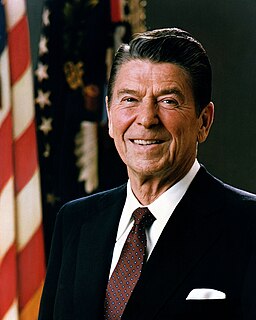
Ronald Wilson Reagan was an American politician who served as the 40th president of the United States from 1981 to 1989. A member of the Republican Party, he previously served as the 33rd governor of California from 1967 to 1975 after a career as a Hollywood actor and union leader.
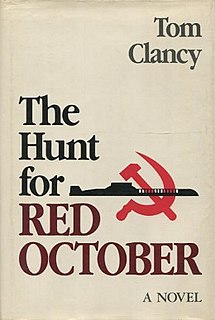
The Hunt for Red October is the debut novel by American author Tom Clancy, first published on October 1, 1984 by the Naval Institute Press. It depicts Soviet submarine captain Marko Ramius as he seemingly goes rogue with his country's cutting-edge ballistic missile submarine Red October, and marks the first appearance of Clancy's most popular fictional character, Jack Ryan, an analyst working for the Central Intelligence Agency, as he must prove his theory that Ramius had intended to defect to the United States.

The "Evil Empire" speech was a speech delivered by U.S. President Ronald Reagan to the National Association of Evangelicals on March 8, 1983 during the Cold War. In that speech, Reagan referred to the Soviet Union as an "evil empire" and as "the focus of evil in the modern world". Reagan explicitly rejected the notion that the United States and the Soviet Union were equally responsible for the Cold War and the ongoing nuclear arms race between the two nations; rather, he asserted that the conflict was a battle between good and evil.

The Reagan Doctrine was stated by United States President Ronald Reagan in his State of the Union address on February 6, 1985: "We must not break faith with those who are risking their lives—on every continent from Afghanistan to Nicaragua—to defy Soviet-supported aggression and secure rights which have been ours from birth." It was a strategy implemented by the Reagan Administration to overwhelm the global influence of the Soviet Union in the late Cold War. The doctrine was a centerpiece of United States foreign policy from the early 1980s until the end of the Cold War in 1991.

Caspar Willard Weinberger was an American statesman and businessman. As a prominent Republican, he served in a variety of state and federal positions for three decades, including Chairman of the California Republican Party, 1962–68. Most notably he was Secretary of Defense under President Ronald Reagan from 1981 to 1987.
In political science, rollback is the strategy of forcing a change in the major policies of a state, usually by replacing its ruling regime. It contrasts with containment, which means preventing the expansion of that state; and with détente, which means a working relationship with that state. Most of the discussions of rollback in the scholarly literature deal with United States foreign policy toward Communist countries during the Cold War. The rollback strategy was tried and was not successful in Korea in 1950 and in Cuba in 1961, but it was successful in Grenada in 1983. The political leadership of the United States discussed the use of rollback during the uprising of 1953 in East Germany and the Hungarian Revolution of 1956, but decided against it to avoid the risk of Soviet intervention or a major war.

Peter Franz Schweizer is an American political consultant and writer. He is the president of the Government Accountability Institute (GAI), senior editor-at-large of far-right media organization Breitbart News, and a former fellow at the conservative Hoover Institution.

Frances FitzGerald is an American journalist and historian, who is primarily known for Fire in the Lake: The Vietnamese and the Americans in Vietnam (1972), an account of the Vietnam War. It was a bestseller that won the Pulitzer Prize, Bancroft Prize, and National Book Award.
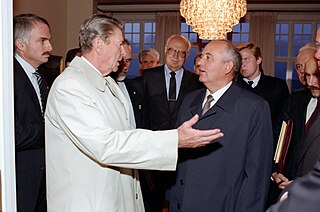
The Reykjavík Summit was a summit meeting between U.S. President Ronald Reagan and General Secretary of the Communist Party of the Soviet Union Mikhail Gorbachev, held in Reykjavík, Iceland, on 11–12 October 1986. The talks collapsed at the last minute, but the progress that had been achieved eventually resulted in the 1987 Intermediate-Range Nuclear Forces Treaty between the United States and the Soviet Union.

Cold Mountain is a 1997 historical novel by Charles Frazier which won the U.S. National Book Award for Fiction. It tells the story of W. P. Inman, a wounded deserter from the Confederate army near the end of the American Civil War who walks for months to return to Ada Monroe, the love of his life; the story shares several similarities with Homer's Odyssey. The narrative alternates back and forth every chapter between the stories of Inman and Ada, a minister's daughter recently relocated from Charleston to a farm in a rural mountain community near Cold Mountain, North Carolina from which Inman hails. Though they only knew each other for a brief time before Inman departed for the war, it is largely the hope of seeing Ada again that drives Inman to desert the army and make the dangerous journey back to Cold Mountain. Details of their brief history together are told at intervals in flashback over the course of the novel.
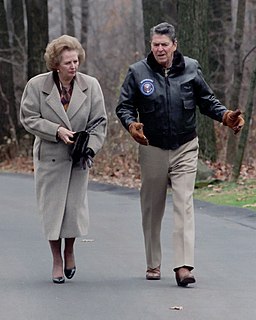
The main goal of the US foreign policy during the presidency of Ronald Reagan (1981–1989) was winning the Cold War and the rollback of Communism—which was achieved in the Revolutions of 1989 in Eastern Europe during 1989; in the German reunification in 1990; and in the Dissolution of the Soviet Union in 1991. Historians debate whom to credit, and how much. They agree that victory in the Cold War made the U.S. the world's only superpower, one with good relations with former Communist regimes in Russia and Eastern Europe.

Jack Foust Matlock Jr. is an American former ambassador, career Foreign Service Officer, a teacher, a historian, and a linguist. He was a specialist in Soviet affairs during some of the most tumultuous years of the Cold War, and served as the U.S. Ambassador to the Soviet Union from 1987 to 1991.
This bibliography of Ronald Reagan includes major books and articles about Ronald Reagan, the 40th president of the United States, and his policies.
Mars Crossing is a science-fiction novel by Geoffrey A. Landis about an expedition to Mars, published by Tor Books in 2000. The novel was a nominee for the Nebula award, and won the Locus Award for best first novel in 2001.
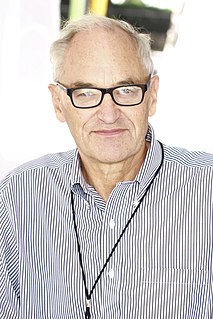
Michael Dobbs is a British-American non-fiction author and journalist.

Roger Rosenblatt is an American memoirist, essayist, and novelist. He was a long-time essayist for Time magazine and PBS NewsHour. He is currently the Distinguished Professor of English and Writing at Stony Brook University.
David Emanuel Hoffman is an American writer and journalist, a contributing editor to The Washington Post. He won a Pulitzer Prize in 2010 for a book about the legacy of the nuclear arms race.

In The Plex: How Google Thinks, Works, and Shapes Our Lives is a 2011 book by American technology reporter Steven Levy. It covers the growth of the Google company from its academic project origins at Stanford to the company that is rolling in billions of long-tail advertising dollars, forms the central exchange for information on the internet, having by then already grown to 24,000 employees.

The speeches and debates of Ronald Reagan comprise the seminal oratory of the 40th President of the United States. Reagan began his career in Iowa as a radio broadcaster. In 1937, he moved to Los Angeles where he started acting, first in films and later television. After delivering a stirring speech in support of Barry Goldwater's presidential candidacy in 1964, he was persuaded to seek the California governorship, winning two years later and again in 1970. In 1980, as the Republican nominee for president of the United States, he defeated incumbent Jimmy Carter. He was reelected in a landslide in 1984, proclaiming that it was "Morning in America". Reagan left office in 1989.

The Reckoning: Our Nation's Trauma and Finding a Way to Heal is the second book written by Mary L. Trump about her uncle Donald Trump, who had served as the President of the United States from early in 2017 until early in 2021. Preceded by Too Much and Never Enough in 2020, it was published on August 17, 2021 by St. Martin's Press.


















